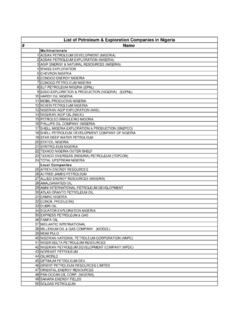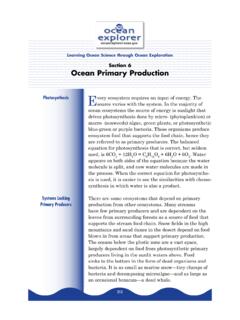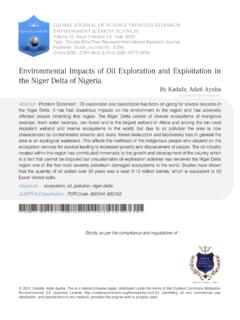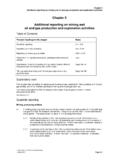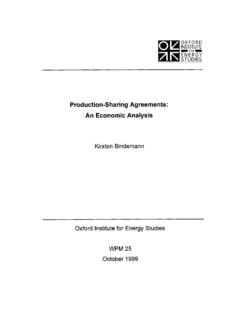Transcription of ASSESSING THE ENVIRONMENTAL IMPACT OF OIL AND …
1 1 ASSESSING THE ENVIRONMENTAL IMPACT OF OIL AND GAS exploration IN GHANA 2 TABLE OF CONTENT ENVIRONMENTAL issues ..2 2 Determinants and trends of oil activities in IMPACT of oil and gas activities on the marine Accidental Air ENVIRONMENTAL 3 Introduction Offshore oil and gas activities have developed in Ghana s maritime (Jubilee field) area over the last 5 years. Overall, activities are still expanding as the petroleum sector has become a major economic feature of the economy of Ghana. However, while the country continue to benefit from windfall from the sector, the country has begun to grapple with ENVIRONMENTAL IMPACT associated with all stages of oil and gas activities, particularly, exploration and production . Emerging ENVIRONMENTAL Issues Arising in Oil and Gas exploration ENVIRONMENTAL IMPACT of oil and gas exploration and production arise at various stages of oil and gas activities including, initial exploration , production and decommissioning at the final stage.
2 There is a broad range of ENVIRONMENTAL concerns such as oil discharges from daily operations, the use of chemicals, accidental spills, drill cuttings, emissions into the atmosphere, low level naturally occurring radioactive material, noise, and to some extent, the placement of installations and pipelines on the sea bed. Determinants and trends of oil activities in Ghana The overall determinants and extent of oil and gas activities and the potential for future developments in the Jubilee Oil field are still increasing with the second Floating, production , Storage and Offloading (FPSO) John Evans Atta Mills commencing operations on August 18, 2016. The Western Region (Jubilee field) has the highest levels of oil and gas exploration , appraisal and production , with production in matured fields currently on-going at the cape three points. Important oil and gas activities are therefore located in Western Region while oil and gas production in deep sea areas of the six coastal districts of Ahanta West, Shama, Nzema East/West, Jomoro, Elembelle and Sekondi-Takoradi.
3 Is still at an early stage. 4 However, as figure 1 depicts, many factors influence the petroleum sector. They include economic factors such as long-term trends in oil and gas prices, international energy demand and energy security for countries worldwide. Other factors include the resource potential of areas, the geology of the deposit, the regulatory environment and infrastructure capacity. Figure 1. Trend of world crude oil prices from year 2000 and beyond Source: Bloomberg, Wall Street, RBC Economics Research The diagram above illustrates the movement of crude oil prices oil and down from 2000 till 2016. Ghana came into the production of oil in 2011 after the discovery of oil in 2007. The total revenues to Government from the oil and gas exploration has been falling over the past three years of production due to the lower price levels of crude oil on the world market. This has led to a halt in the exploration and production of many oil fields. 5 IMPACT of oil and gas activities on the marine environment The main pressures from the petroleum sector on the marine environment include impacts from operational and accidental discharges of chemicals, crude oil, polycyclic aromatic hydrocarbons, alkyl phenols and heavy metals.
4 In addition, there are often effects from atmospheric emissions, radioactive material and high noise levels. Oil is released from a variety of sources during exploration and production activities. Most oil entering the marine environment from such activities is produced water, but deck and machinery space drainage may also contain small quantities of oil. Oil released flaring is another potential source of oil from offshore activities, though this is generally considered insignificant. Accidental release during drilling, the operation of offshore installations and from shipping may also occur. The main discharges of chemicals however arise from drilling activities and discharges of chemicals in produced water because the use of chemicals is critical for the production of oil and gas. The main use of chemicals for drilling and production operations and includes: Rig and turbine washes; Pipe dopes used to lubricate drill pipe joints; Hydraulic fluids used to control wellheads, blow-out preventers and subsea valves; Chemicals used in the actual production and processing of hydrocarbons; and Water-based and organic phase drilling fluids.
5 Unwanted effects from chemicals discharged into the marine environment can include acute or long term toxic effect to marine organisms and cause allergy, skin irritation or more serious effects such as cancer in humans. 6 Accidental discharges Accidental discharges of oil and chemicals arise from a number of different sources, including equipment failure, or human errors during offloading and filling of tanks, clean-up operations and drainage of sea sumps. Ageing infrastructure may increase the risk of accidents resulting in oil spills. Since oil and gas production in 2011, there has been a greater awareness by industry for the need to report all spills irrespective of the spill size. This may be due to better regulatory controls and increased ENVIRONMENTAL awareness. Air pollution The offshore oil and gas industry requires substantial power in order to extract, process and export hydrocarbons. The main sources of air pollution are from power generation and flaring of hydrocarbons during well testing and clean-up operations meant to ensure safety at the platform.
6 These are the main sources of the majority of the atmospheric emissions. Tanker loading and offloading also contribute to emissions, particularly volatile organic compounds (VOCs). Light There are concerns over the potential impacts of lighting and flaring on birds from offshore structures. A video documentary by the Institute of Financial and Economic Journalists (IFEJ) in May, 2016 suggests flaring directly impacts flock of birds particularly, during the migration periods. However, the study also estimates that about 10% of the atmospheric air impacts the surrounding towns of the Jubilee Fields (IFEJ, 2016). 7 An assessment of the scale of IMPACT in the six coastal districts waters concluded that, under certain weather conditions, large numbers of birds can occasionally be attracted to offshore platforms. In an interview with Raybon Bulley, the Vice President of the Institute of Financial and Economic Journalist (IFEJ), the lighting on the FPSO s draws fishes closer to the drilling areas which are protected from fishermen.
7 Noise Noise arising from activities related to the offshore oil and gas industry includes elements such as construction work, drilling, ships traffic and seismic surveys. This has an IMPACT on the stable ecosystem of the sea and on the habitat. Loads of oil tankers with huge amount of oil plying the various roads each day also have IMPACT on the noise level within the surrounding communities. ENVIRONMENTAL Impacts The ENVIRONMENTAL impacts of the oil and gas exploration activities are enormous and cannot be overlooked. These impacts tends to affect the ecosystem in the coastal regions in Ghana. To begin with, burning of natural gas, employed to dispose of associated gas is connected with crude oil production . Gas flaring contributes to climate change, which has serious implications for both Ghana and the rest of the world. It has been established that burning of fossil fuel, mainly coal, oil and gas has led to global warming. In Ghana, Tullow Oil was permitted to flare a total amount of 75 million standard cubic feet of gas daily in July 2015 due to the breakdown of the compressor on the FPSO.
8 8 Secondly, gas flaring gives rise to the pollution of the atmosphere as a result of the release of oxides of Nitrogen, Carbon and Sulphur (NO2, CO2, CO, SO2), particulate matter, hydrocarbons ash, photochemical oxidants, and hydrogen sulphide (H2S). These contaminants acidify the soil and depletes soil nutrient. Studies have shown that the nutritional value of crops within such vicinity are reduced. In some cases, there is no vegetation in the areas surrounding the flare due partly to the tremendous heat that is produced and acid nature of soil. The effects of the changes in temperature on crops include stunted growth and withering of crops. Furthermore, there are adverse effects such as haematological effects on humans: The implication of gas flaring on human health are related to the exposure of those hazardous air pollutants emitted during incomplete combustion of flared gas. These pollutants are associated with a variety of adverse health impacts, including cancer, neurological and effects on reproduction.
9 Deformities in children, lung damage and skin problems have also been associated with gas flaring. Hydrocarbon compounds are known to cause some adverse changes in hematological parameters. These changes affect blood and blood-forming cells and could give rise to anemia (aplastic), pancytopenia and leukemia. Moreover, in addition to the health and ENVIRONMENTAL consequences of gas flaring, the nation also loses billions of dollars worth of gas which is literally burnt off daily in the atmosphere though much of this can be converted for domestic use and for electricity generation. In an interview with Mr. Kojo Agbenor-Efunam, the Deputy Director of the ENVIRONMENTAL Protection Agency (EPA) under oil and gas sector, he said the oil producing companies need commendation for heeding to the safety and security measures of the industry . He added again that even though there have been some gas flaring around the Jubilee Field due to power outages, the situation has not affected the 9 atmospheric surroundings in the Western region and especially the coastal districts due to the minute nature of the flaring.
10 However, a lot of fisher folks complain about the loss in the fish catch due to restrictions around the oil and gas field. The use of light on the Jubilee tend to draw lot of fishes closer to the machines on the exploration field and reduce the amount of fishes that are harvested each day by the fishermen in deep waters. Recommendations Problems of ENVIRONMENTAL degradation has been on the rise since the discovery and the production of oil in Ghana. To ensure sustainable ENVIRONMENTAL management, oil companies do not only need to adhere to the rules and regulation governing oil production , but, there is also the need for the following practical steps. In the first place, co-operate organizations in the petroleum industry need to establish health facilities that are based on need. In addition, the ENVIRONMENTAL Protection policies should be carried out with utmost sense of responsibility. It is not just enough to enact stringent and lofty laws without implementation.
